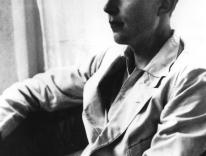In a remarkable reflection (that almost sums up his encyclical, Spe Salvi), Pope Benedict commemorated All Souls Day. The whole reflection is quite worth pondering, but here is his concluding paragraph:
This yearly commemoration, often marked by visits to the cemetery, is an occasion to ponder the mystery of death and to renew our faith in the promise of eternal life held out to us by Christ's resurrection. As human beings, we have a natural fear of death and we rebel against its apparent finality. Faith teaches us that the fear of death is lightened by a great hope, the hope of eternity, which gives our lives their fullest meaning. The God who is love offers us the promise of eternal life through the death and resurrection of his Son. In Christ, death no longer appears as an abyss of emptiness, but rather a path to life which will never end. Christ is the resurrection and the life; whoever believes in him will never die. Each Sunday, in reciting the Creed, we reaffirm our faith in this mystery. As we remember our dear departed ones, united with them in the communion of the saints, may our faith inspire us to follow Christ more closely and to work in this world to build a future of hope.
In a recent seminar discussion we spoke of the mysterious interpenetration of death and life, and that the attempts to deny or flee death often eventuated in shrinking one's capacity for a full life, indeed at times turning death-dealing. I had occasion to recall the words of Etty Hillesum in her diary, published as An Interrupted Life:
By "coming to terms with life" I mean: the reality of death has become a definite part of my life; my life has, so to speak, been extended by death, by my looking death in the eye and accepting it, by accepting destruction as part of life and no longer wasting my energies on fear of death or the refusal to acknowledge its inevitability. It sounds paradoxical: by excluding death from our life we cannot live a full life, and by admitting death into our life we enlarge and enrich it.


